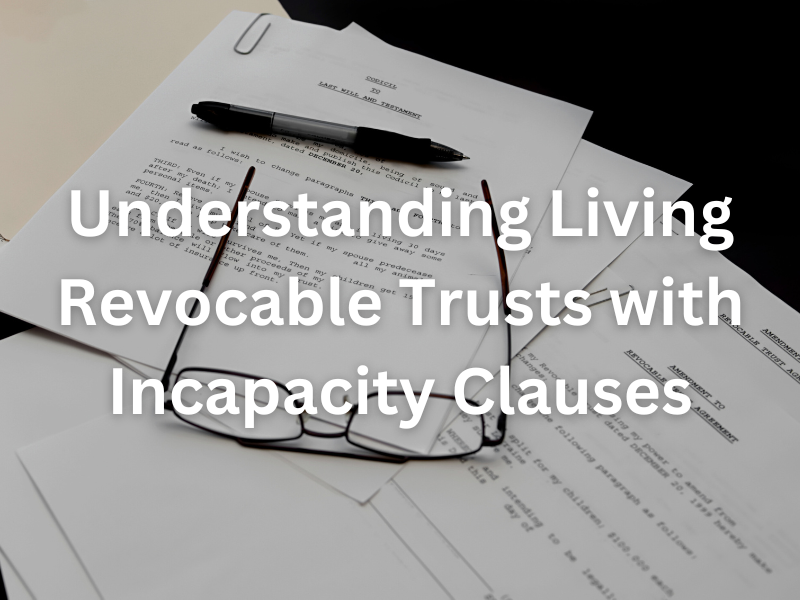
Revocable trusts established as part of an estate plan typically contain incapacity clauses, which direct a successor trustee to assume control of the trust assets if the person who established the trust becomes incapable of making financial decisions. The person who establishes a revocable living trust is referred to as the grantor or settlor. If the grantor loses capacity or passes away, the designated successor trustee steps in and manages the trust.
A trust’s bylaws would typically define incapacity as being no longer capable of making decisions about financial affairs. The trust bylaws can require one or more doctors to certify whether the grantor has temporary or permanent incapacity.
Essentials of a Revocable Living Trust
A revocable living trust allows the trust grantor to direct the distribution of assets in the trust while alive and after their death and avoid probate court. Because assets are in the trust, they pass outside of the probate court process upon the grantor’s death. Trust bylaws can direct the successor trustee to distribute certain trust property or trust assets to the named beneficiaries.
The successor trustee would take over asset management of the trust upon certification of the grantor’s incapacity. The bylaws of the trust should spell out the incapacity plan and what constitutes incapacity. The bylaws may require a signed and witnessed letter from the grantor’s doctor as certification of mental incapacity.
It is essential that the grantor transfers assets into the trust. A trustee only has the right to manage assets that are titled in the name of the trust. For example, the grantor would need to record a new deed to transfer the title of their home to the trust so that the successor trustee would have the right to sell the house to help move the incapacitated grantor into skilled nursing care.
Upon the grantor’s incapacity or death, a revocable trust becomes an irrevocable trust. Irrevocable trusts cannot be modified, nor can assets be added to the trust.
In some cases, mental incapacity may only be temporary, such as due to illness or injury. The trust bylaws should state that if or when the condition rendering the grantor incapacitated has been resolved, the grantor will resume control of the trust.
Criteria for Incapacity in a Revocable Living Trust
 The grantor and his or her estate planning attorney would draft the trust’s bylaws as part of the legal document establishing the trust. The incapacity clause would need to define “incapacity.” Under California law, lack of legal capacity is based on evidence of a deficit in one or more mental functions rather than on a diagnosis of a person’s mental or physical disorder.
The grantor and his or her estate planning attorney would draft the trust’s bylaws as part of the legal document establishing the trust. The incapacity clause would need to define “incapacity.” Under California law, lack of legal capacity is based on evidence of a deficit in one or more mental functions rather than on a diagnosis of a person’s mental or physical disorder.
The law says, “a person is of unsound mind or lacks the capacity to make a decision or do a certain act, including, but not limited to, the incapacity to … execute wills, or to execute trusts” if there is evidence of a deficit in at least one of several listed mental functions and it significantly impairs the person’s ability to understand the consequences of his or her actions with regard to the type of act or decision in question.”
Mental functions that will be examined for a finding of incapacity include several facets each of:
- Alertness and ability to concentrate.
- Information processing and ability to plan, organize, and carry out actions in one’s own rational self-interest.
- The presence of severely disorganized thinking.
- Ability to modulate mood and affect, a pervasive and persistent or recurrent state of euphoria, anger, anxiety, fear, panic, or depression inappropriate for the individual’s circumstances.
A requirement for one or more physicians to certify incapacity adds protection but also delays action. Presumably, the grantor’s primary care physician would have to refer the patient to another medical professional for a second opinion.
Once a doctor has declared the trust’s grantor incapacitated, the successor trustee would gather certification(s) of incapacity, the trust document, and any other relevant legal document, such as a power of attorney or living will authorizing them to act on behalf of the grantor. The successor trustee will need these documents to prove and establish their legal authority when they contact financial institutions and other parties to execute on behalf of the trust.
In addition to assuming responsibility for the trust, the successor trustee should contact beneficiaries and other parties associated with it and keep them informed of the grantor’s health status and the successor trustee’s actions regarding the trust.
Talk to a Trust Contest Lawyer In California
When the grantor of a revocable trust in California is declared incapacitated, this can become an important issue for the beneficiaries of the trust. Lack of capacity and undue influence are frequently cited as grounds for trust contests.
Incapacitated family members may be unduly pressured by adult children or coerced by others into changing the beneficiaries of a trust or creating revocable living trusts before a declaration of their incapacity is obtained.
If you are a trust beneficiary, you should know the identities of the other beneficiaries and the successor trustees and be ready to raise questions if unexpected individuals take control of the trust or benefit from it upon the grantor’s declaration of incapacity or death.
If you suspect fraud, undue influence, or other malfeasance in the creation or revision of a trust or beneficiary designations in California, you should contact a trust contest attorney who understands the legal process and California laws regarding the creation and administration of trusts. Having the right attorney can help you make informed decisions.
At Albertson & Davidson LLP, we are trial lawyers who focus on trust and estate litigation to fight for our clients’ inheritances and best interests. Our law firm includes estate litigation attorneys who have extensive experience litigating complex and often emotionally charged issues surrounding the transfer of assets through trusts, wills, and the probate process. Our firm has recovered more than $250 million in verdicts and settlements for deserving clients in courtrooms throughout California.
Contact us online or at (800) 601-0170 today for a free initial legal consultation. We maintain offices in Los Angeles, San Francisco, Orange County, and Silicon Valley. We stand. We fight. We win.

